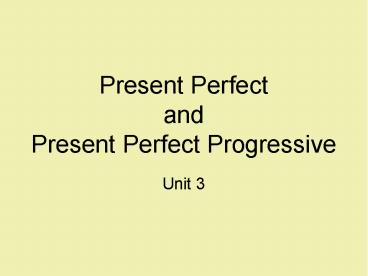Present Perfect and Present Perfect Progressive Unit 3 - PowerPoint PPT Presentation
Title: Present Perfect and Present Perfect Progressive Unit 3
1
Present PerfectandPresent Perfect Progressive
Unit 3
2
Present Perfecthave / has past participle
3
Past Participle
- Regular Verbs
- dance ? danced
- answer ? answered
- cry ? cried
- Irregular Verbs
- eat ? eaten
- go ? gone
- write ? written
4
Present Perfect
- I
- You
- We have (not)
- They ve
- eaten (worked,
studied) - He
- She has (not)
- It s
5
When to use the Present Perfect?
6
1.Use the present perfect with for and since to
talk about things that started in the past,
continue up to the present and may continue into
the future. Tom has attended Mt. SAC for six
months. Tom has taken classes since
February. Note He started attending Mt. SAC
six months ago, he is still attending Mt.
SAC, and he may continue going to Mt. SAC in
the future.
7
2. Use the present perfect when you dont
know when something happened or when the
specific time is not important.
He looks familiar. Im sure Ive seen him
before but I dont remember when or where.
Ive decided to eat healthier meals.
8
Present Perfect Progressive have
been Present Participle has
Present Participle working, eating.
9
Present Perfect Progressive
- I
- You have (not)
- We ve
- They been working.
- He
- She has (not)
- It s
10
When to use the Present Perfect Progressive?
11
- Use the present perfect progressive to talk about
situations that started in the past and continue
up to the present. These situations are usually
not finished and they will probably continue into
the future. - It has been raining since 600.
- (It started raining at 600 and its still
raining now.)
12
NoteThe present perfect or the present perfect
progressive can be used with verbs such as live,
work, study and teach with for and since and the
meaning is the same. Hes studied ESL for a
year. Hes been studying ESL for a year.
13
NoteThe present perfect or the present perfect
progres-sive can be used to talk about things
that happened in a period of time that is not
finished, such as today, this morning (afternoon,
evening, week, month, year, summer, semester)
Ive had two cups of coffee this morning.
(Its still morning. I might have more coffee.)
Weve been studying hard this semester.
14
Present Perfect and Present Perfect
ProgressiveDifferences
15
1.
- Present Perfect
- finished activity
- Ive written my report.
- (I finished the report)
- Present Perfect Pro.
- unfinished activity
- Ive been writing my
- report.
- (Im still writing it.)
16
2.
- Present Perfect
- how many times
- Jane has gone to Asia
- and Europe three times.
- how many things
- Janes visited two conti-
- nents and four countries.
- Present Perfect Prog
- how long
- Janes been traveling
- around the world since
- June.
- Jane has been traveling
- for the past 10 years.
17
Time clauses with sinceSince S Simple
Past
S
VYou havent changed since you won the lottery.
main clause
time clause Since you left me,
Ive been crying day after day.
18
Time Markers
- 1. for
- Use for length of time
- for a week, for many years, for an hour
- Theyve been dating for a year.
- I havent seen Tony for a while.
19
2. since
- Use since specific time
- since 1945, since Sunday, since June
- Alans been living here since last year.
- Victor hasnt visited his family since May.
20
3. already
- It is used to say that something has happened
before now. - Mike has already applied for this job.
- Jennifer has finished her report
already. - It is used in questions to show surprise that
something happened sooner than expected. - Has Nicole already gotten married?
21
4. not yet
- It is used to say that something has not happened
before now. - Paul hasnt yet found a job.
- The mail hasnt arrived yet.
- Yet is use in questions to find out if something
has happened before now. - Have you moved yet?
22
5. ever It means at any time up to
now.
- for questions
- Have you ever won anything valuable?
- Has Peter ever asked you a favor?
23
6. just, recently, lately
- They are used to talk about event in the very
recent past. - They have just bought a house.
- Mr. Payne has recently retired.
- I havent had time lately.
- Note In spoken English people often use just and
- recently with the simple past tense.































